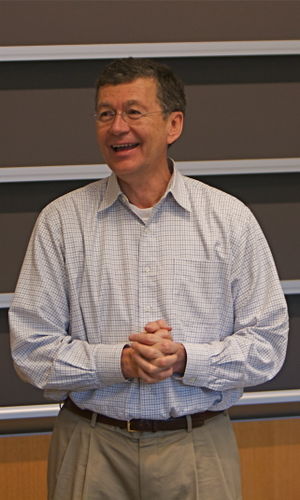Reed Hundt
(lawyer, bureaucrat) | ||||||||||||||
|---|---|---|---|---|---|---|---|---|---|---|---|---|---|---|
 | ||||||||||||||
| Born | Reed Eric Hundt March 3, 1948 Ann Arbor, Michigan | |||||||||||||
| Alma mater | Yale College, Yale Law School | |||||||||||||
| Children | 3 | |||||||||||||
| Spouse | Elizabeth "Betsy" Katz | |||||||||||||
| Member of | Covington & Burling | |||||||||||||
Federal Communications Commission Chairman, then consultancy firm McKinsey and Covington & Burling
| ||||||||||||||
Reed Eric Hundt[1] is an American attorney who served as chairman of the United States Federal Communications Commission from November 29, 1993 to November 3, 1997.[2] Appointed by President Bill Clinton, he served for most of Clinton's first term. He was succeeded by William Kennard.
Between 1998 and 2008, Hundt was a senior advisor to McKinsey, the consulting firm. He was also on the board of Intel Corporation 2001-20. He was a senior adviser to the law firm, Covington & Burling, in Washington, D.C., from 2014 to 2019.
Biography
Hundt attended high school in Washington D.C. at St. Albans School, graduating in 1965.[1] He went to Yale College, where he majored in history, and worked on the Yale Daily News. Hundt taught school for several years before graduating from Yale Law School in 1974. He clerked for Harrison Lee Winter, a Baltimore judge on the United States Court of Appeals for the Fourth Circuit, before moving to Los Angeles, where he became the 85th lawyer at Latham & Watkins, one of the top law firms in the world.
In 1980, Hundt moved to the Latham & Watkins' Washington, D.C., office. In his litigation career at the firm, Hundt appeared in court in 48 states and the District of Columbia, argued appellate cases in almost all circuits, and handled cases in many topic areas, although he specialized in antitrust.
Meanwhile, from 1983 and onwards, Hundt played many diverse roles in helping Al Gore's political career. In 1992-3 he was part of the Clinton-Gore transition team, and chaired the committee that drafted the partly successful carbon tax introduced and passed in the House of Representatives in 1993. It was not passed through the Senate.
In 1993 President Clinton, whom Hundt had known in law school, nominated Hundt to be chairman of the Federal Communications Commission. He was confirmed in November 1993, which was approximately the same time that the Internet became commercially viable because of the confluence of the first popular browser, Mosaic, and the decision of the CERN laboratory to release for free the Berners-Lee World Wide Web software protocols that enabled any connected computer to navigate the Internet.
Serendipitously, that same month saw Congress empower the FCC to create the structure and function of the digital cellular market in the United States by means, among other things, of spectrum auctions - of great interest to future employer McKinsey - then having previously been tried only in isolated cases in small countries.
Congress gave the FCC vast powers to regulate and de-regulate all digital markets when it passed the Telecommunications Act of 1996, signed by digital signature of President Clinton in the Library of Congress in February 1996. The FCC then essentially re-wrote the regulatory landscape for wireless and wireline communication.
Hundt is the CEO and co-founder of the Coalition for Green Capital, a non-profit engaged in the creation of green banks in the United States and internationally, and Making Every Vote Count, a non-profit advocating to make the national popular vote relevant to selecting the President.
Between 1998 and 2008, Hundt was a senior advisor to McKinsey, the consulting firm.
He also served on many technology company boards from 1998 to the present, co-founded four firms, gave many speeches, wrote five books, and penned numerous articles. He has written "You Say You Want A Revolution: A Story of Information Age Politics" (Yale:2000) and "In China's Shadow: The Crisis of American Entrepreneurship" (Yale: 2006) as part of the Future of American Democracy Foundation's Future of American Democracy Series. Additionally, Hundt published e-books entitled Zero Hour: Time to Build the Clean Power Platform (Odyssey, 2013) and, along with Blair Levin, The Politics of Abundance: How Technology Can Fix the Budget, Revive the American Dream and Establish Obama's Legacy (Odyssey: 2012). Most recently, Hundt wrote A Crisis Wasted: Barack Obama's Defining Decisions (Rosetta Books: 2019).